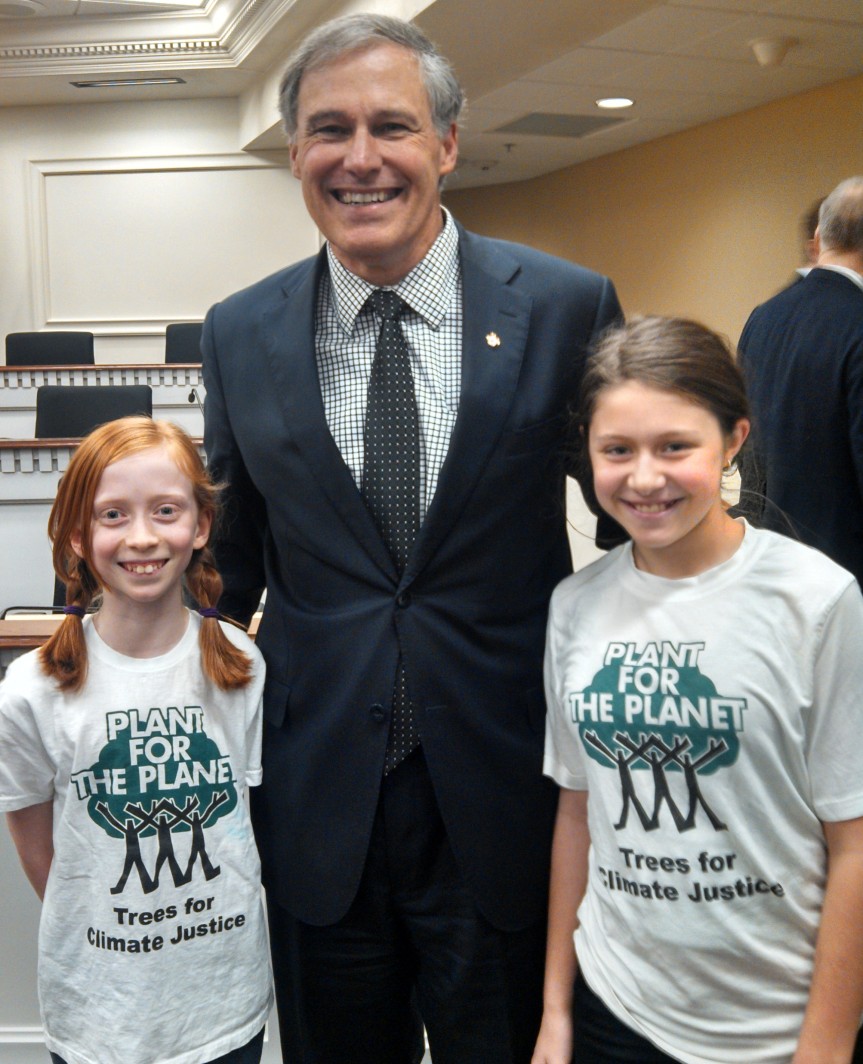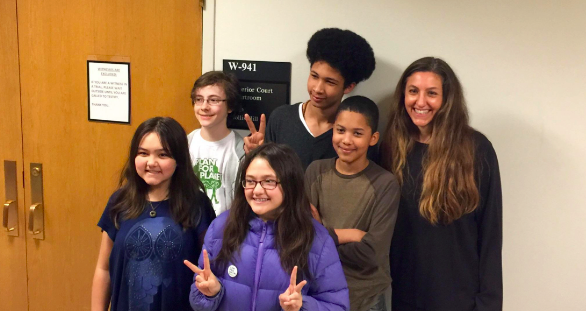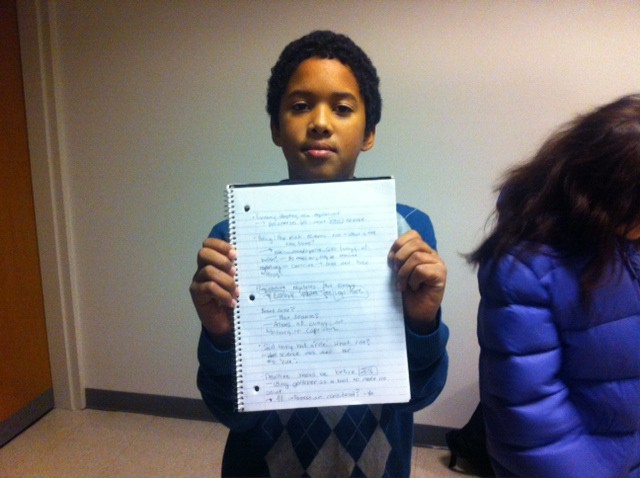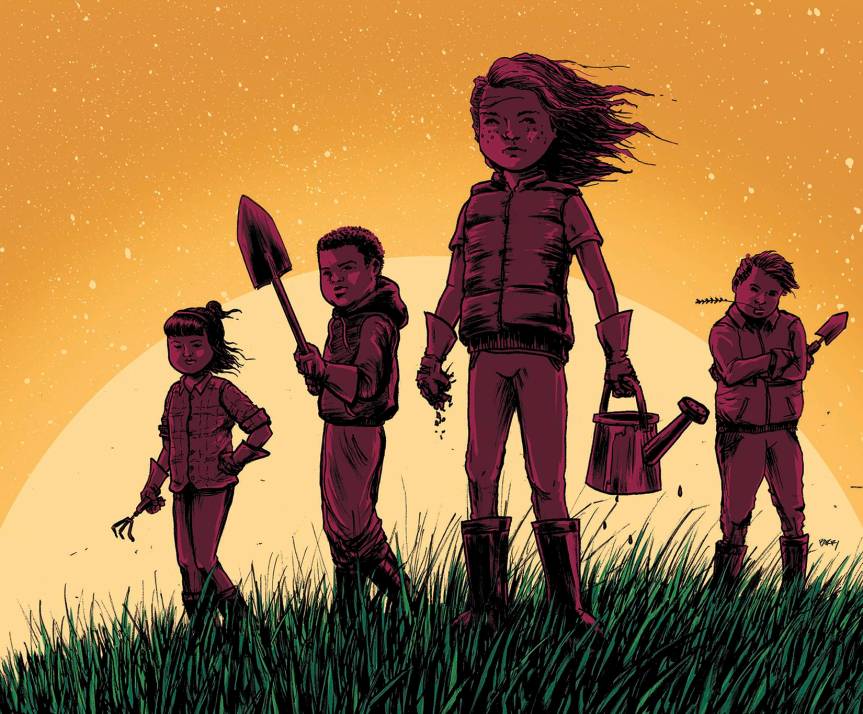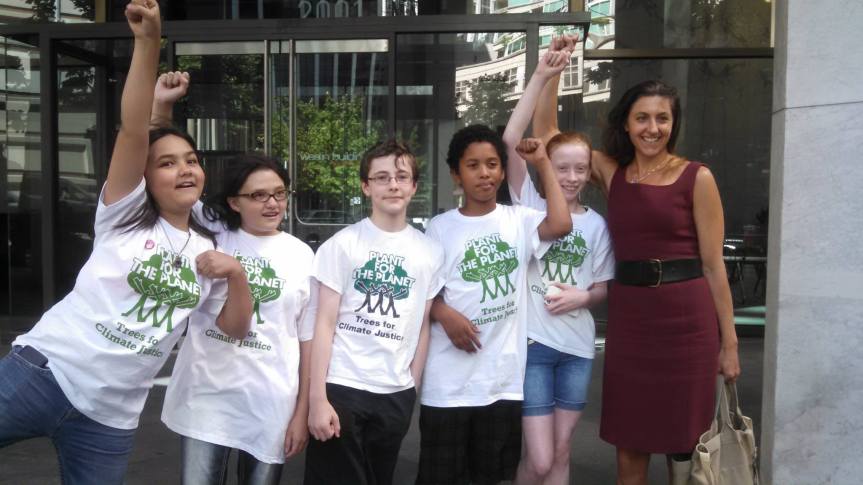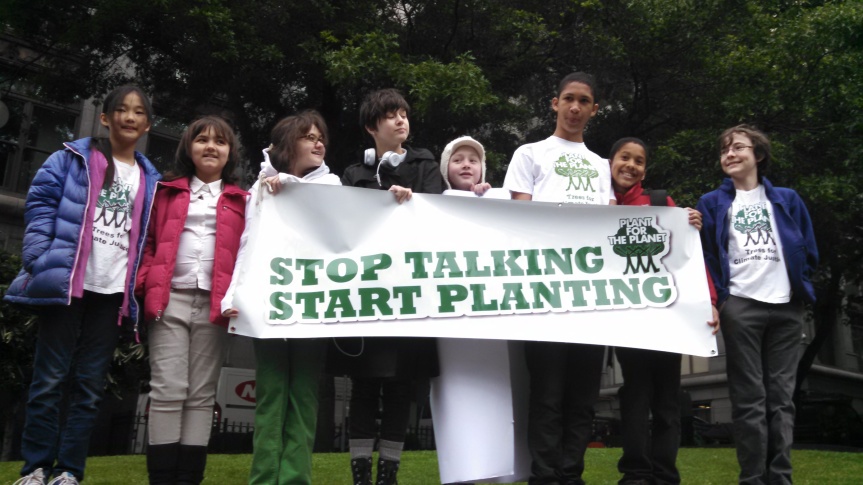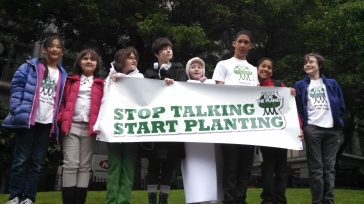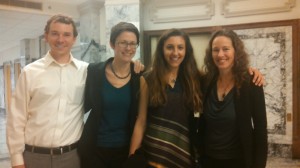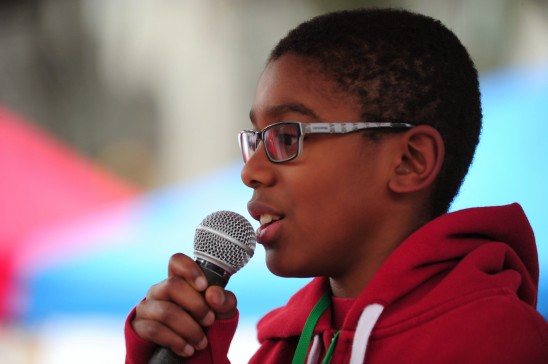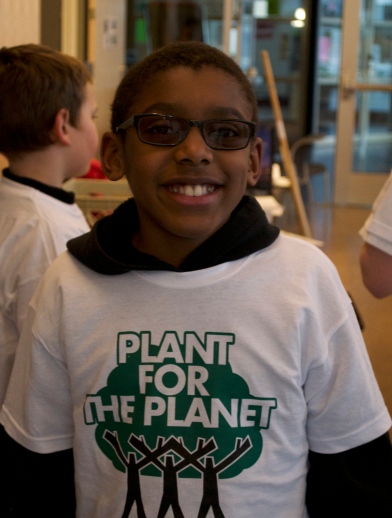It’s a Friday night at the Good Shepherd Center in Wallingford, and Joey and Grace, ages 9 and 11—tiny, wiry, and ebony-haired—are tumbling over each other to tell me what they know about climate change. Their introduction to the concept is pretty difficult to pinpoint, though, since it’s always been there, “like all those other facts,” says Grace.
“It’s just, like, a regular thing,” adds Joey.
Still, for my benefit, the siblings cast their minds back to the old days, when they knew about climate change, but they didn’t know that much about it.
“We knew it was caused by people burning oil and gas, but we didn’t understand what it meant,” offers Grace.
“We didn’t know how it works, we didn’t understand the effects, we didn’t understand how fast it was happening,” Joey says at a rapid clip. “We thought it happened in, like, 150 years, the big effects?”
“Something like that,” says Grace.
But now they’re aware that “the big effects are already somewhat happening,” says Joey. “There’s natural global warming . . . but this isn’t natural.” And then, with some gravitas: “If we don’t make some big changes by 2020, it won’t matter how much we try to help after.”
They share their feelings about that.
“Frustration . . . anger.”
“Frustration . . . annoyance. And kind of like . . . nobody getting it!”
“And a little bit this desperate need, like, ‘We need to do something! Why won’t you understand that?! Whyyyy?!’ ”
We’re at the tail end of a monthly meeting of the Seattle chapter of Plant for the Planet, an international environmental club with 34,000 young members in 50 countries who have collectively planted more than 14.2 billion trees. There are snacks and games, as you’d expect at a kid meeting—muffins, cookies, carrot sticks, a swift round of hide and seek, some dashing about and shrieking and breathless laughter.
But mostly it’s quite serious. Moderated by the group’s 13-year-old president, Gabe Mandell, the young activists are celebrating the myriad climate wins of 2015—Shell is out of the Arctic! Obama vetoed Keystone XL!—and planning their next tree-planting workshops and retreats, as well as discussing the climate news of the day, such as the Trans-Pacific Partnership, a controversial trade agreement that could allow multinational corporations to skirt carbon policies.
These are the kids, aged 8 to 14, who’ve trained to become “Climate Justice Ambassadors”—the official title of every member of Plant for the Planet who participates in a day-long “Academy”—giving ebullient speeches to their peers at school and at climate events. They’ve shown up at Shell, Keystone, oil train, and Gates Divest protests; they’ve testified at climate conferences and hearings; they’ve urged the Seattle City Council to put warning labels on gas pumps. They’ve also spent time with Governor Jay Inslee and former Vice President Al Gore and been featured in the HBO documentary Saving My Tomorrow; they’ve planted 11,000 trees and started a state-level challenge to plant a billion. They’ve co-hosted workshops and trainings all over the Puget Sound area and inspired the creation of a Plant for the Planet chapter in Portland. They’re about 375 strong since their inception in early 2013, with a few dozen active members. And eight of them were plaintiffs in a highly publicized lawsuit petitioning the Washington State Department of Ecology to develop a carbon-emissions rule for the sake of their fundamental rights—a lawsuit that they almost won.
“A lot of the times when I hear bad things about [climate change], I start to cry, and I feel pretty depressed,” says Sierra Gersdorf-Duncan, an 11-year-old fifth-grader so gripped by the crisis of ocean acidification that she’s been interviewed for a Philippe Cousteau documentary on the topic. But that kind of climate despair, she says, in herself and others, is “what we need to change. We have to tell them, ‘You’re right, these terrible things are happening, but we can do something about it.’ ”
If you, like Sierra, are 11 today, you were born not long before Hurricane Katrina struck New Orleans. Then, nearly every year of your existence, the world has seen epic climate-related disasters: Hurricane Sandy, Typhoon Haiyan, massive flooding in Pakistan, Pacific islands slipping underwater, Alaskan villages toppling from coastal bluffs, endless drought in California, and catastrophic wildfires in Washington. Every year seems to surpass the last as the “hottest year on record”; 2015 just beat out 2014 for the highest global average temperatures ever recorded, and 15 of the planet’s 16 hottest years occurred after 2001.
Also, if you are 11, you were born just before the release of Al Gore’s An Inconvenient Truth, which marked a sea change in public perception around the concept—in this country, anyway—making “global warming” and “climate change” household terms as well as the stuff of political debate. More recently, you saw one of the largest international summits ever convened on this or any topic, and President Obama has been making climate speeches almost since you could speak.
By some accounts, we are beyond predictions and have entered the age of climate consequences. The entire lifetime of today’s children falls into that age. In 2050, the year that some of the more dire climate scenarios could begin to unfold, an 11-year-old will be 45.
“It affects us personally,” says 9-year-old Joey. “Most grownups will not be around long enough to see the big, awful effects I was talking about. For us . . . we’ll be middle-aged. We’ll be fully alive and have to worry about it.”
The kids’ passion has made an impact on the local climate movement. Put onstage, they frequently pull grand, tearful statements—and sometimes actions—out of our elected officials.
“Everything stops when the kid opens their mouth,” says parent and activist Michael Foster, creator of Plant for the Planet in Seattle. He’s taken these kids to a slew of climate events, he says, and without fail, when the kids speak, adults listen. “Whoever is sitting on that panel, behind that table, doodling their notes on their pad . . . The pencils go down. They make eye contact. They are paralyzed, not breathing, until that kid finishes.”
Kids speaking up for themselves, for the planet they’ll inherit—it’s effective. 350 Seattle has been known to call these kids their “secret weapon.” But it’s not just some cheap ploy to fill out a climate agenda: The weapon works because the kids care, too.
Tim Deppe, a Climate Ambassador who just turned 10, says all the bad stuff he hears about climate change doesn’t make him sad. “Not sad, no,” he says. “Passionate.”
The journey to Plant for the Planet in Seattle began with a single Google search.
In late 2012, Foster trained with Al Gore’s Climate Reality Leadership Corps, and since his children were in fourth and sixth grade at the time, he figured he’d do a slide show for their science class. But the talk he’d prepared was pretty grim, and he wasn’t going to just slap on some sweet nothings at the end. “I cannot end a talk with, ‘But we’re gonna build a whole bunch of windmills, so you guys are going to be all right,’ ” he says. “That’s such a lie.”
So he plugged “children save the world” and “climate” into a Google search bar and the top hit was a video put together by a German wunderkind named Felix Finkbeiner, who at age 9 decided that the best way to get around the climate crisis was to plant trees. Today the 17-year-old has been named the 2015 “European of the Year” by Reader’s Digest, addressed the United Nations, and launched a global organization with the goal of planting a trillion trees by 2020. (There are about three trillion trees on the planet today, but we’re still losing an estimated 15 billion every year to agriculture and development.)
Planting trees: It’s a simple concept for kids to grasp, and it’s one possible solution to climate change, since forests are huge carbon banks—they absorb planet-warming CO2 while pumping out oxygen. It also gives children something to hold onto in the face of “all this gloom-and-doom Al Gore stuff,” Foster says. He folded Finkbeiner’s video and call to action into his science-class presentation, and it was a total hit. Kids cheered, teachers wiped their eyes. “I was like, ‘Oh my God,’ ” he recalls. “‘I’ve got to do this slide show more.’ ”
Foster has since presented to about ten thousand kids in Seattle, by his estimation, and gotten on the phone with Finkbeiner, who chastised him for not having started a Seattle chapter of Plant for the Planet sooner. He’s also been a major connector for climate activists working with kids, as well as for local politicians—he’s brought Mayor Ed Murray as well as House Speaker Frank Chopp and representative Jamie Pedersen (D-Seattle) to various Plant for the Planet events. His two daughters were also the named plaintiffs in Zoe & Stella Foster v. Washington Department of Ecology, the kids’ climate-change lawsuit. It was one of many state-level lawsuits filed by Oregon-based nonprofit Our Children’s Trust—a way to force action on climate change through the courts by using a legal principle called the “public trust doctrine” (and a secret weapon called “children”). Getting on board with that, Foster says, was easy: He stumbled across an Our Children’s Trust video and recognized a Carkeek Park landmark behind Andrea Rodgers, one of the attorneys working on the cases, who, it turned out, lived in Seattle. He called her and said, “ ‘I need to talk to you.’ And she said, ‘Is this Michael Foster? I need to talk to you!’ It’s a pretty small network of climate activists working with kids around the country.”
The kids got their final day in King County court last November; they’d been petitioning the Department of Ecology to create a carbon-emissions rule based on the best available climate science since summer 2014. While they lost their case in the end, Judge Hollis Hill nevertheless created a legal precedent that thrilled climate activists: the idea that the Washington state constitution should in fact protect the atmosphere for future generations. According to Judge Hill’s ruling, the only reason she dismissed the kids’ case was because the Department of Ecology was already developing a similar rule. Notably, Ecology is developing that rule because Governor Jay Inslee ordered it to last summer—11 days after he spent 90 minutes listening to five of the kid plaintiffs asking him to do just that.
Meanwhile, Senator Doug Ericksen (R-Ferndale), chair of the Energy, Environment, & Telecommunications Committee, has sponsored SB 6173, a bill that would overturn Ecology’s ability to make a carbon rule without the help of the legislature. The proposed rule, said Ericksen in a statement, “gives manufacturers a perverse incentive to leave the state of Washington.” The bill passed his committee and is now in the hands of the Rules Committee, which may send it to the Senate floor for a second reading.
“The problem is we’re fighting a propaganda war,” says 11-year-old Grace. “Who can get people to listen more—the oil corporations or people like us?”
She sighs, acknowledging that there are plenty of other problems in the world that she feels sympathetic to, but that we don’t have a spare planet on which to solve those problems. “Honestly, if we don’t do something about climate change now,” she says, “we’re not going to have a chance to worry about the rest of it.”
According to Michael Foster, climate change is a “time crime.” We’re stealing the future from our children by burning fossil fuels with abandon, and we won’t really know it—we won’t know quite how much we’ve stolen—for decades.
It is also, in his view, kind of like second-hand smoke. “I grew up in Texas at a time when everybody smoked everywhere,” he says. “I remember everywhere I went stank, and that’s just how it was. It was like sucking on a tailpipe, just cigars and whatever, all the time. And the idea that I could be a kid in a world of people who are just smoking around me, everywhere, all the time, and know what they’re doing to me? That’s crazy-making.”
That’s why he wants to create an infrastructure for these kids—give them a platform so that “grownups take them seriously, and so they’re not feeling so crazy and isolated and alone with the knowledge that they have.”
Sure, it’s often people like Foster who’ve put that knowledge in these kids’ heads in the first place, but they live in this world too, and they’re listening. 11-year-old Sierra is very, very worried about the ocean’s dying diatoms, for example, but explains that Plant for the Planet “gave me a thing to do about it. The effects [of climate change] are very depressing, but once you get involved, it doesn’t seem that hard because you have all these other people supporting you.”
While some of the kids are interested in science or enjoy being mini-celebrities—it is nice, as former Planet for the Planet president Wren Wagenbach told me, to have somebody “listening to you, for once”—they often have very strong emotional connections to the issue, too. Last summer, 12-year-old Jenny wrote Governor Inslee a letter describing her attachment to a lake and a waterfall in a forest in China: She’d go every year to visit family, but one year when she returned, the forest had been cut down and turned into oil-slicked pavement.
For Grace, it’s about compassion. “If someone’s upset or hurting or angry, it’s like it’s coming off them in waves and I feel it too,” she says. “But it’s not just people I’m actually in direct contact with . . . it’s like, every hurricane, every flood: It hurts.”
It’s not just guilt, then, that makes climate-caring adults lose themselves in the kids’ speeches. It’s also because they’re kids—so optimistic, so emotionally raw, so guileless. They put things in simple terms; they force us to interrogate our own assumptions; and they are utterly convinced that this is a problem we can fix.
Foster paraphrases a sentiment that he heard both Governor Inslee and Al Gore express at a fundraising luncheon in December 2014, following a three-minute call-to-action speech delivered by then-9-year-old Abby. “It’s not because we’re doing this for her,” he says, and he is crying now. His voice trembles. “It’s because she embodies the spirit of who we have to become.”
Adds Foster: “It’s speaking truth to power, and saying, ‘You need to be over here with me. You need to be a little more like me. You need to be a little more bold, a little more courageous. You have to do the impossible.’ ”
As I wrap up my conversation with Joey and Grace, Grace insists several times that I include one very important piece of information in this article. “We need funding,” she says. Planting trees, alas, isn’t free. But “it’s only one dollar per tree! It’s not much!” I promise to mention it. Parents grab their kids’ things, someone plays a riff on the piano, tiny hands grab extra cookies and tiny sneakers squeak as a dozen or so children skip off into the wet night.
Just outside the door, Gabe Mandell reels off some of the intricacies of the Trans-Pacific Partnership. “Do you want me to tell you the two worst things about it?” he asks, then launches into an explanation of the Investor-State Dispute Settlement (ISDS) provision, which would allow corporations to sue governments over laws they find too restrictive in private trade tribunals, and if they establish the tiniest subsidiary in a country that has lax carbon or public-health laws, they can opt to abide by those laws, instead of the countries they do most of their business in.
He then takes care to remind me—although, at this moment, I’m quite convinced—that this is not just kid stuff.
People “look at us and they just see a bunch of kids planting trees, or whatever,” he says, exasperated. “I think we really need to get it out that we are an organization that is dedicated to fighting climate change! We’re doing things. We’re not just a bunch of kids getting together on a Friday. We’re a bunch of kids getting together and trying to do solutions that many grownups aren’t.”
Sara Bernard writes about environment and education, among other things, for Seattle Weekly. She can be reached at sbernard@seattleweekly.com or 206-467-4370. Follow her on Twitter at @saralacy.

